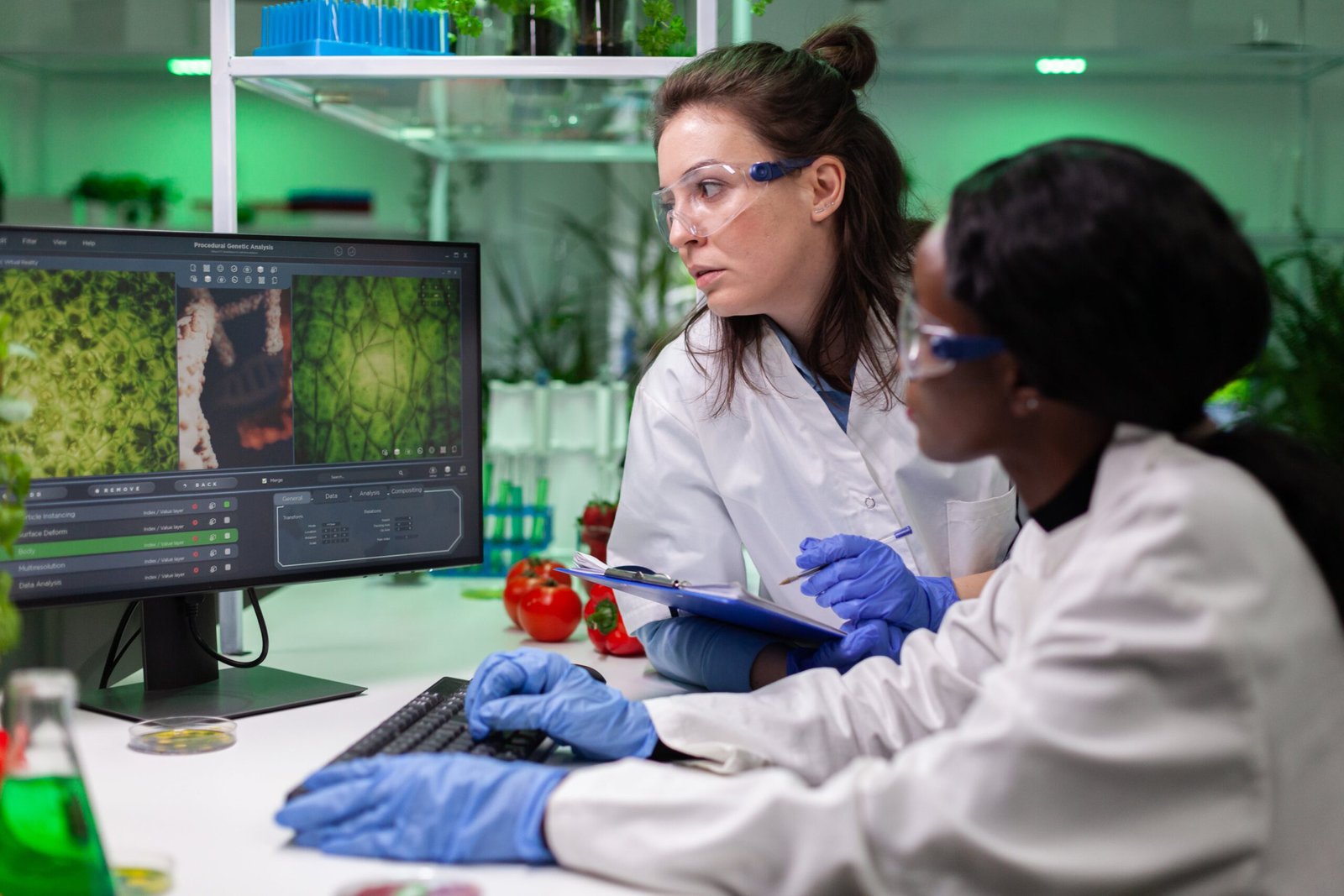Biotechnology in 2025: Innovations Transforming Our Future

Biotechnology in 2025: Innovations Transforming Our Future

Introduction
- Overview of biotechnology and its impact on healthcare, agriculture, and industry.
- The importance of biotechnological advancements for global challenges.
- Focus on future trends and breakthroughs in 2025.
The Role of Biotechnology in Healthcare
- Revolutionizing Precision Medicine: Advances in gene therapy and CRISPR technology for personalized treatment.
- AI-Driven Drug Discovery: Accelerating drug development using AI and big data.
- Bioprinting and Regenerative Medicine: Innovations in creating tissues and organs for transplants.
- Vaccines and Pandemic Preparedness: Biotechnology’s role in combating emerging diseases.
Agricultural Biotechnology: Feeding a Growing Population
- Genetically Modified Crops: Enhancing crop yields, resistance to pests, and climate adaptability.
- Sustainable Farming Practices: Biotech innovations in soil health and precision agriculture.
- Alternative Proteins and Lab-Grown Meat: Reducing reliance on traditional livestock farming.
- Genome Editing in Agriculture: Customizing plants for better nutrition and longer shelf life.
Industrial Biotechnology: Driving Sustainable Innovation
- Bio-based Materials: Replacing plastics with biodegradable alternatives.
- Synthetic Biology: Engineering microorganisms to produce biofuels and biochemicals.
- Carbon Capture and Bioconversion: Using biotech to mitigate climate change impacts.
- Scaling Up Biomanufacturing: The rise of eco-friendly industrial processes.
Advances in Genomics and Proteomics
- Single-Cell Sequencing: Unraveling cell-specific insights for targeted therapies.
- Proteomics in Diagnostics: Identifying biomarkers for early disease detection.
- Epigenetics Research: Understanding gene regulation for improved treatments.
The Promise of Synthetic Biology
- Building Synthetic Organisms: From concept to real-world applications.
- Biological Computing: Merging computing with living cells for bio-digital solutions.
- Designer Molecules and Materials: Custom-tailored biotech products.
Ethical Challenges in Biotechnology
- Gene Editing Controversies: Balancing benefits with ethical considerations.
- Privacy Concerns in Genomic Data: Securing personal information in a biotech-driven world.
- Environmental Risks: Addressing potential impacts of engineered organisms.
Biotechnology Startups and Investment Trends
- Rise of Biotech Startups: Innovations from emerging companies.
- Global Investment in Biotech: Trends in funding and key players.
- Collaborations Between Academia and Industry: How partnerships drive advancements.
Government Policies and Regulatory Changes
- Streamlining Biotech Approvals: Faster pathways for therapies and products.
- Global Collaboration: Nations working together to standardize biotech regulations.
- Balancing Innovation and Safety: Creating frameworks for ethical biotechnology.
Education and Workforce in Biotechnology
- Preparing for Biotech Careers: Emerging skillsets and training programs.
- Interdisciplinary Collaboration: Bridging biology, technology, and engineering.
- Women in Biotechnology: Increasing representation and leadership.
Conclusion
- Summary of key advancements expected in biotechnology by 2025.
- Call to action: The need for collaboration, innovation, and ethical considerations in shaping the future.
- Encouragement for readers to explore more on biotechnology trends and their global impact.
FAQs
- 1. What is biotechnology, and how does it impactdaily life?
Biotechnology is the use of biological systems, organisms, or derivatives to develop products and technologies that improve life. It impacts daily life through advancements in medicine, such as personalized therapies and vaccines, agricultural innovations like genetically modified crops, and eco-friendly solutions such as biodegradable materials and biofuels. From healthcare to food production, biotechnology plays a vital role in addressing global challenges.
- 2. How is CRISPR revolutionizing genetic research?
CRISPR (Clustered Regularly Interspaced Short Palindromic Repeats) is a groundbreaking gene-editing tool that allows scientists to modify DNA with precision. It has revolutionized genetic research by enabling the correction of genetic disorders, development of disease-resistant crops, and the study of genes in unprecedented ways. Its potential for curing inherited diseases and accelerating scientific discovery is transforming medicine and agriculture.
- 3. What are the benefits of synthetic biology in agriculture?
Synthetic biology enhances agriculture by engineering plants and microorganisms for improved efficiency and sustainability. It enables the development of crops with higher yields, better nutrient content, and greater resistance to pests and environmental stress. Additionally, synthetic biology supports the production of biofertilizers and alternative proteins, reducing the reliance on traditional livestock and chemical inputs.
- 4. How does biotechnology contribute to sustainability?
Biotechnology contributes to sustainability by offering eco-friendly alternatives in various industries. It helps reduce reliance on fossil fuels through biofuels, minimizes waste with biodegradable materials, and promotes sustainable farming practices with precision agriculture. Biotech solutions also address climate change by enabling carbon capture, improving energy efficiency, and fostering circular economies.
- 5. What ethical issues surround biotechnology advancements?
Ethical issues in biotechnology include concerns about genetic editing, such as altering human embryos or creating genetically modified organisms (GMOs). There are debates about privacy and security related to genomic data and potential environmental risks posed by engineered organisms. Balancing innovation with ethical considerations is essential to ensure that biotechnological advancements are used responsibly and equitably.



